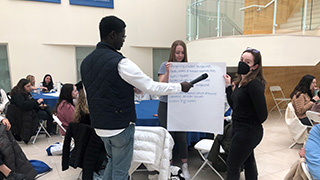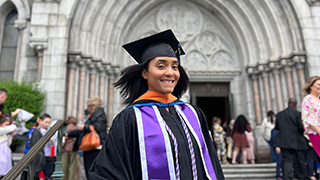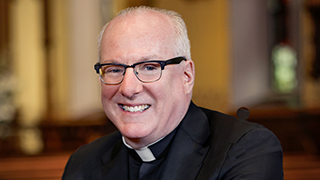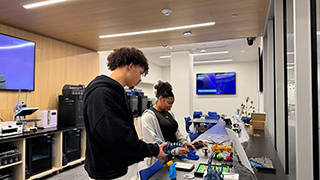Students React to Professor’s Presentation on Culturally Responsive Teaching - Seton Hall University
Tuesday, May 9, 2023

Overall, attendees took well to the presentation and what Professor Adjapong had to say. Senior Catherin San, an ESED major, commented on the challenge she welcomes when it comes to culturally responsive teaching: "I think it’s easy to shy away from rigor when it comes to non-content subjects. In elementary grades, you have to me more literal for students. In this way, CRT techniques sometimes have to be very obvious."
San continued by saying, "To really get students to understand a clear message, it might be an instinct to cut away as much distracting details/contextual information. I think it is okay to challenge students! They will eventually begin to consider wider contexts of CRT and it can always prime their brains to look at issues with more perspective."
Brian Reilly, a senior studying Secondary Education and Mathematics, noted that it is important for educators to understand that they can synthesize culturally responsive teaching into the lessons without diluting the lesson’s academic rigor. "This program was a great reminder," he said, "of the importance to make our classrooms culturally relevant for our students at all times. It is important to remember the rigor of the assignment does not get lowered when making your class culturally relevant. The rigor stays and challenges students to stay engaged and explore their learning."
Mimi Contreras shared similar thoughts on the importance of synthesizing responsive teaching with everyday lesson plans. She remarked, "I really enjoyed this workshop! Understanding how to incorporate culturally responsive teaching within the classroom and lessons was beneficial." Graduating this May with a Certificate of Eligibility with Advanced Standing (CEAS)/Master in Special Education, Contreras said that she left the presentation better prepared to be a special education teacher.
Many of the students attending Professor Adjapong’s program seem to take away similar lessons and themes. Many understood that teaching at any grade level is a complicated task, especially when trying to combine tolerance with learning. However, many felt much more at ease with the task after Professor Adjapong’s program. This was likely because of how digestible Professor Adjapong’s programming was according to those in attendance.
"I found Professor Adjapong's program informative, engaging, and relevant," remarked Maya Dobrygowski, a fourth-year student in the Speech Language Pathology and Special Education program. "Throughout the presentation we weren't just learning about what it means to be a culturally responsive educator," she continued, "but we were also applying the learned information to different hands-on mini projects as a means of putting the methodology into practice."
Summarizing everyone’s mood nicely was Secondary Education major and senior Emma Selinger. Commenting on the program, she said, "I liked collaborating with my peers to discuss culturally relevant teaching methods and see how we could apply them in our content areas. There are so many more ways to do it than I thought!"
Categories: College of Human Development Culture and Media






